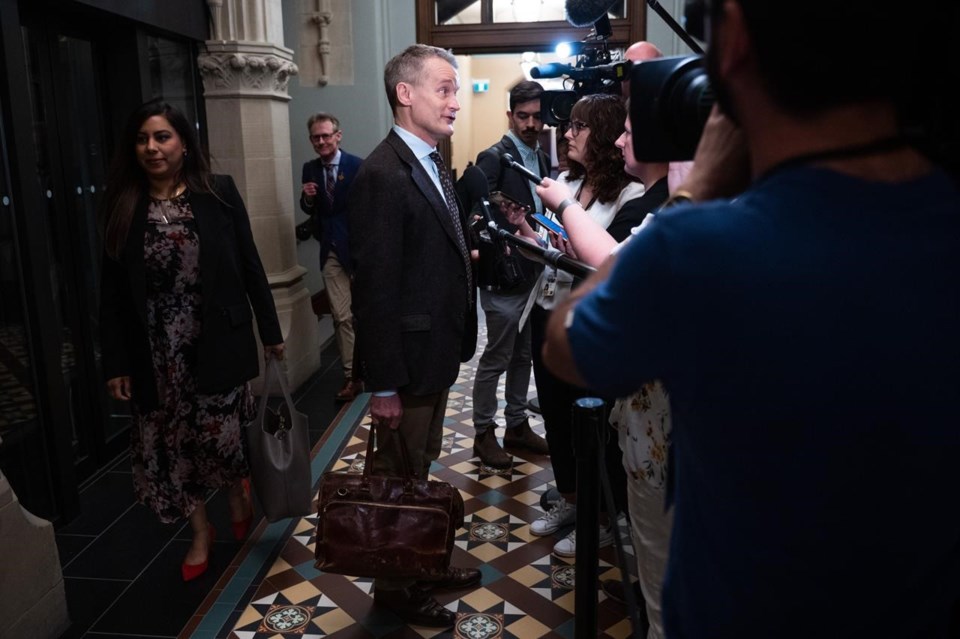OTTAWA — The Liberal government is keen to tackle the problem of disinformation, but that will not include regulating the use of sources, Labour Minister Seamus O'Regan said Wednesday.
He said the government will not move on a policy resolution approved at the federal Liberal party convention May 6. The resolution could venture into regulating journalistic practices, which O'Regan said is a non-starter.
"We would never allow that to become law," O'Regan said.
"Not on my watch."
The resolution speaks to the rise of disinformation, particularly online, and the problems that has created for trust in government and media.
It specifically calls for fighting the rise of disinformation through efforts that include holding "online information services" accountable for what they publish and barring the use of sources that cannot be traced.
O'Regan said while the policy doesn't directly address media sources, there could be ramifications for them and therefore for freedom of the press.
Regulations requiring all sources of published material to be traced could be read as a restriction on the use of anonymous sources, for example.
"It would be a ramification if it was ever law," O'Regan said.
Prime Minister Justin Trudeau likewise has dismissed any notion that the resolution will be taken up by his government.
The policy will be part of official Liberal party policy for the next eight years, but the government is not bound to implement it, and the party does not have to campaign on it.
Catherine Evans, a Liberal party member from Vancouver, sponsored the resolution.
She said at the convention disinformation is a problem that "is essential to our democracy and it must be addressed."
She told reporters at the event that she didn't intend to target journalists with the resolution, but rather the plethora of online sites that make wild claims without any notion of the origins of the information.
The resolution was one of 24 approved at the convention. Some of them were fast-tracked right to the final vote before the convention even began, but this one had to go through some debate and an initial vote in a policy workshop with a smaller group of Liberals.
The final vote May 6 could have involved all 4,000 Liberals registered for the convention, but fewer than 200 participated. It passed with a show of hands.
All 24 resolutions that passed were later ranked for importance by the party's members when they voted electronically for the party's new president. The combating disinformation policy was ranked 10th.
O'Regan's concerns are shared by many in cabinet, including Environment Minister Steven Guilbeault. He said in French Wednesday that policy conventions are meant to have vigorous debate, and sometimes the membership gets things right. But in this case, he thinks the membership got it wrong.
Toronto Liberal MP Julie Dzerowicz tweeted that she ranked it second among the resolutions, behind only a guaranteed basic income.
In an interview Wednesday, Dzerowicz said she does not support anything that would interfere with freedom of the press or journalistic integrity, including regulating the sources used in online news.
But Dzerowicz said disinformation and misinformation are two of her biggest concerns, and something she's hearing a lot about from her constituents as well.
"It's something I worry about a lot," she said.
Policy resolutions at a convention are not to be taken as if they would be absorbed and adopted by the government, she said. But this one raises concerns about a problem and opens the door to a conversation on how to solve it.
O'Regan said he has to reflect on the fact this policy was adopted and is immediately being disavowed. He said he doesn't know if the people who voted for it fully understood the ramifications of what it could do.
The Liberals have previously been accused of attempting to censor online sites through Bill C-11, which became law last month.
The new law seeks to enforce the Canadian content provisions placed on traditional radio or television broadcasters, on online sites like YouTube or Spotify when they broadcast commercial content.
Conservatives have called it a piece of censorship legislation that will allow the government to dictate what online sites can and cannot publish.
But the Liberals say that isn't remotely what the new law does. Rather, the government says it ensures that Canadian artists are given their due on online broadcasts within Canada.
This report by The Canadian Press was first published May 10, 2023.
Mia Rabson, The Canadian Press



